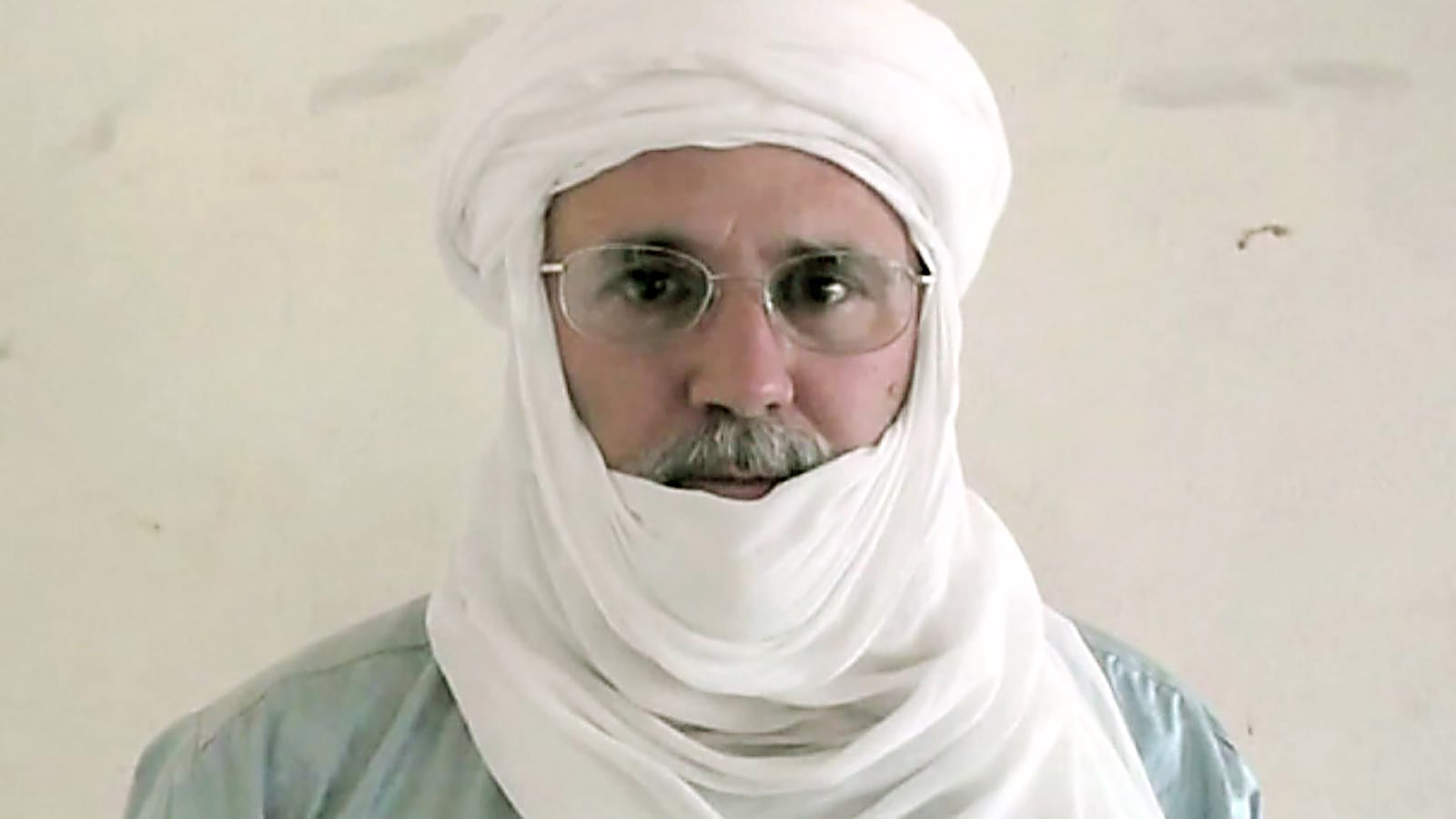CALABAR, Nigeria—When Sweden’s foreign minister, Margot Wallström, announced late last month that Johan Gustafsson—who was kidnapped by al Qaeda militants in Mali in 2011—had been released and reunited with his family, rumors went round the West African nation that more foreign hostages would be freed in the coming days.
But that didn’t happen.
Instead, the jihadis holding more than half a dozen Westerners put them in front of cameras and, in effect, on the market, pushing their respective countries to negotiate their release.
The al Qaeda affiliated group known as Nusrat al Islam wal Muslimeen—an organization formed by the merger of terrorist groups in the Sahel and West Africa with the Saharan branch of al Qaeda in the Islamic Maghreb (AQIM)—issued a video showing Stephen McGowan of South Africa, Elliot Kenneth Arthur of Australia, Iulian Ghergut of Romania, Beatrice Stockly of Switzerland, Gloria Cecilia Narvaez of Colombia, and Sophie Petronin of France.
These hostages were kidnapped when the several groups were operating separately. Now, the merger in March has brought all the victims under the same terrorist umbrella.
In many cases, we have seen these poor prisoners before. The jihadi groups in the Sahel have often released proof-of-life videos of their Western victims.
But there is one glaring exception.
In October it will be a year since Jeffery Woodke, 56, an American humanitarian worker, was kidnapped from his home in Abalak, Niger, by armed men who killed two guards before driving him across the desert into neighboring Mali. Since the abduction, nothing has yet been said about him by the jihadis.
Woodke, who is from McKinleyville, California, is a longtime aid worker with the Youth With a Mission charity and has been living in Niger since 1992, helping local tribes overcome drought and food shortages. On the website of The Redwood Coast School of Missions, a Christian mission based in the town of Arcata in California, he is listed as an instructor.
The FBI kidnapping notice shows a stocky man with a gray goatee and a winning smile. In Abalak, he spoke the local language, wore a turban and traditional dress, and was very well-liked. The town’s mayor reportedly said after the kidnapping it was “such a devastating shock the whole city cried.”
A U.S. State Department official speaking on background told The Daily Beast the case is being followed closely and there is “enough information to know that he is alive,” but would say nothing more specific than that.
Woodke’s abduction was the first time an American citizen has been kidnapped in Niger, but it isn’t the jihadis’ first try in that highly restive country.
In 2009, Islamist militants from AQIM attempted to abduct U.S. embassy personnel from a hotel in the town of Tahoua about 232 miles north of the country’s capital, Niamey. The plot failed.
Malian investigators have since tracked the kidnappers of Woodke and believe the American missionary is being held by the Movement for Oneness and Jihad in West Africa (MOJWA), another faction linked to al Qaeda.
Tahoua Region, where Abalak is located, is an area where “MOJWA militants have been very active for years,” said Christian Anozie, editor of Event Diary magazine, a West African news publication that operates from Lagos in Nigeria. “Woodke could probably have been driven by land to the deserts of northern Mali, which is where most hostages are taken.”
While we may not be exactly sure about al Qaeda’s silence over Woodke, we can easily guess that the terror group is buying time to understand what to do with the missionary. It probably would have learned from the cases of Luke Somers in Yemen in 2014 and Warren Wenstein on the Afghanistan-Pakistan border in early 2015, where the Obama administration ignored calls for a ransom payment and tried instead to free them using U.S. military forces—with fatal results for both hostages.
Perhaps the group wants to see if President Donald Trump maintains the same policy, which has been questioned bitterly by many families of those who’ve been taken hostage in the past.
Apart from Woodke, who is believed to still be in Mali, five other Americans are being held by the Taliban Haqqani group in Afghanistan. The missionary’s case is particularly worrisome, however, because of the silence.
“Al Qaeda doesn’t always like to rush in negotiating the release of its hostages,” said Anozie, who has followed events in Mali since violence began in the north of the country in 2012. “They consider a lot of things, like the current financial situation and the political climate.”
Kidnapping Americans isn’t always good business for jihadis, because of the strict U.S. policy against paying ransoms or making other kinds of concessions. The terror organization by now should know that even American organizations that Woodke has ties with will be reluctant to raise money to free him for fear of prosecution.
But the U.S., too, should know that things don’t often end well when an American is held by jihadi groups, as we’ve seen in many cases in the past, including those of Somers and Wenstein.
According to a report by New America released in January, "To Pay Ransom or Not to Pay Ransom," co-authored by Peter Bergen, American hostages are more than twice as likely to die in captivity, remain captive, or be murdered by their captors as hostages from other Western nations.
Hostages from countries such as Austria, France, Germany, Spain, and Switzerland, that have a record for paying ransoms, are far more likely to be freed, even when they are held by the terrorist groups that are most likely to kill those they kidnap.
The U.K., with a no-ransom policy similar to the U.S., is the other country whose abducted citizens have been freed at rates much lower than other Western nations. Out of 10 European hostages held by jihadi terror groups, eight were freed, compared to a quarter for the U.S. and nearly a third for the U.K.
Most of the murdered Western hostages are American or British. Of the 90 Western hostages murdered by their captors between 2001 and 2016, close to half were American and one sixth were British.
Taking a closer look, 15 Americans were taken hostage by the so-called Islamic State and groups it has links with. Of that number, 13 were murdered, one died in captivity, and one was released.
All four Americans ISIS abducted in Syria lost their lives in captivity. Three of them—James Foley, Steven Sotloff, and Peter Kassig—were murdered. The other, Kayla Mueller, died in captivity.
By contrast, 14 out of the 16 continental European hostages held by ISIS in Syria were released by the jihadis.
In June of 2015, the Obama administration issued Presidential Policy Directive 30 concerning "hostage recovery activities." It created the new post of "special presidential envoy for hostage affairs," and the Hostage Recovery Fusion Cell (HRFC) to coordinate among the many concerned agencies. It also emphasized the need to work closely with families, not antagonistically, as had happened in the past.
Some 18 months later, according to the New America report, the fusion cell reported it had overseen the release of about 100 hostages, but provided no details. We know from press reports of two who were held by Houthi rebels in Yemen, and one, Kevin Patrick Dawes, released by the Syrian government. Another American believed in Syrian custody, journalist and former Marine Austin Tice, remains unaccounted for.
There is no record of the fusion cell freeing hostages held by jihadists. And the core of the policy remains as it was: "The United States will use every appropriate resource to gain the safe return of U.S. nationals who are held hostage. But the United States Government will make no concessions to individuals or groups holding U.S. nationals hostage," the Obama directive declares.
Will the Trump administration try to apply the president's "art of the deal" to hostage cases? Thus far, there is no change in policy.
If the militants holding Woodke are aware of these facts, and presumably they are, they will take their time working on their own strategies, and we may have to wait more months—or years—to learn what becomes of the American missionary whose abduction brought his adopted hometown in Niger to tears.
With additional reporting by Christopher Dickey





